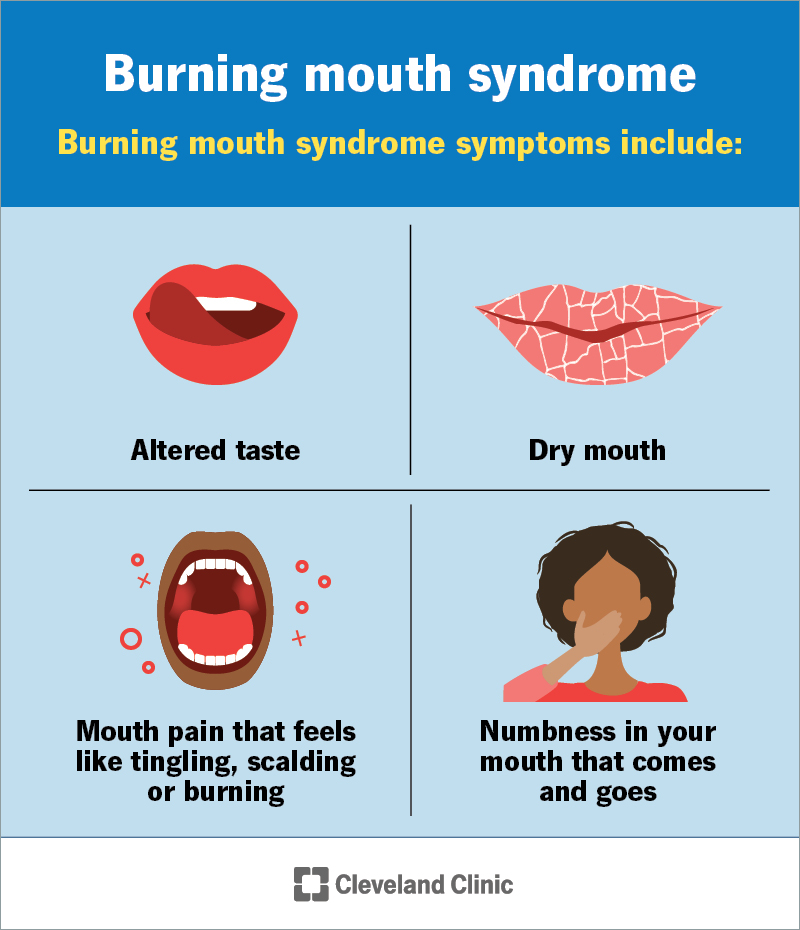Burning mouth syndrome is a painful condition that affects your tongue, lips and other areas inside your mouth. Anyone can get it, but it’s most common in postmenopausal people. There’s no cure, but treatment can help you manage painful symptoms.
Advertisement
Cleveland Clinic is a non-profit academic medical center. Advertising on our site helps support our mission. We do not endorse non-Cleveland Clinic products or services. Policy

Image content: This image is available to view online.
View image online (https://my.clevelandclinic.org/-/scassets/Images/org/health/articles/burning-mouth-syndrome)
Burning mouth syndrome (BMS) is when your tongue, roof of your mouth or lips feel like they’re burning. It can also occur anywhere else in your mouth or throat. BMS can happen fast, and you might not know why. It might feel like something really hot (like coffee) burned your tongue. The medical term for burning mouth syndrome is “glossodynia” (pronounced “glaa-sow-DI-nee-uh”).
Advertisement
Cleveland Clinic is a non-profit academic medical center. Advertising on our site helps support our mission. We do not endorse non-Cleveland Clinic products or services. Policy
If you have BMS, the burning feeling might get worse as the day goes on. Your mouth might feel fine when you first wake up, but then start to burn later. When you go to sleep, the pain might fade. But then, when you wake up, it starts all over again.
Along with the burning feeling, your mouth might taste bitter or metallic. Some people have the sensation of dry mouth even though they have enough saliva. The burning can get so bad that it causes people to feel depressed or anxious.
It’s frustrating to have pain and not know why. Treatment can’t cure burning mouth syndrome, but it can help manage your symptoms. And learning more about possible triggers can help reduce the frequency of flare-ups.
There are two types of burning mouth syndrome:
Burning mouth is most common in postmenopausal people over 60. That’s because lower estrogen levels cause decreased taste bud sensitivity.
Your genetic ability to taste also plays a role. You might be a:
Advertisement
A lot of people with burning mouth syndrome are supertasters who don’t taste things as strongly as they used to. Research shows that many people with BMS also grind their teeth. This can make the burning feeling worse.
Burning mouth syndrome symptoms include:
Burning mouth syndrome doesn’t cause visible symptoms like bumps or discoloration.
Researchers believe the cause of primary BMS is nerve damage affecting the area of your tongue that controls taste and pain. This makes your mouth feel like it’s burning and changes how things taste to you. Researchers think the nerve damage comes from factors like stress, certain medications, nutritional deficiencies or underlying medical conditions.
Medical conditions that can cause secondary BMS include:
You’re more likely to develop burning mouth syndrome if you:
If you have symptoms, see a dentist first. They can start with a visual exam and refer you to a specialist if needed. A healthcare provider will need to run tests to rule out other conditions. Possible tests include:
These burning mouth syndrome remedies may help ease general discomfort:
The U.S. Food and Drug Administration (FDA) hasn’t approved any drugs specifically for BMS. But the medications mentioned may help manage your symptoms. Sometimes, it can take a while to find the medication that works best. Your healthcare provider can help.
If your healthcare provider knows what’s causing burning mouth syndrome, treating that cause can help. For example, if you grind your teeth, your dentist can make you a custom mouth guard for you to wear. If menopause triggers BMS, hormone replacement therapy may help.
Identifying the root cause isn’t always possible. But when it is, it may help find treatment quicker.
Advertisement
You may be able to ease burning mouth pain by doing the following:
These actions won’t get rid of burning mouth syndrome. But they can help reduce pain during flare-ups.
Without treatment, burning mouth syndrome can last for months or even years. That can be a long time to live with mouth pain. BMS treatment can provide relief within days or weeks. Talk to your healthcare provider about your specific treatment and when you can expect to feel better.
You can’t prevent BMS. But you can reduce your risk for flare-ups by avoiding anything that irritates your mouth, including:
Also, make sure you’re getting enough vitamin B12, folate and iron.
Schedule an appointment with a healthcare provider if the burning in your mouth:
Here are some questions you might want to ask your healthcare provider if you have burning mouth syndrome:
Advertisement
When your mouth feels like it’s on fire, it can be hard to think about anything else. Burning mouth syndrome (BMS) is frustrating — and it can take a while to find a remedy that works. Treatment can’t get rid of the condition for good, but it can help with pain and other symptoms. If you think you might have burning mouth syndrome, talk to a dentist first. They can help.
Advertisement

Sign up for our Health Essentials emails for expert guidance on nutrition, fitness, sleep, skin care and more.
Learn more about the Health Library and our editorial process.
Cleveland Clinic’s health articles are based on evidence-backed information and review by medical professionals to ensure accuracy, reliability and up-to-date clinical standards.
Cleveland Clinic’s health articles are based on evidence-backed information and review by medical professionals to ensure accuracy, reliability and up-to-date clinical standards.
If you have conditions affecting your ears, nose and throat, you want experts you can trust. Cleveland Clinic’s otolaryngology specialists can help.
